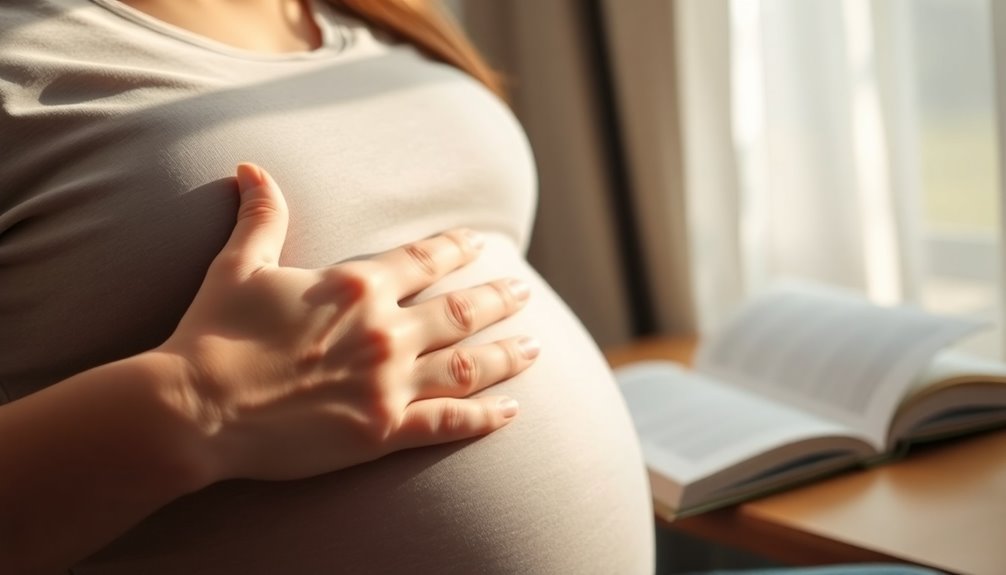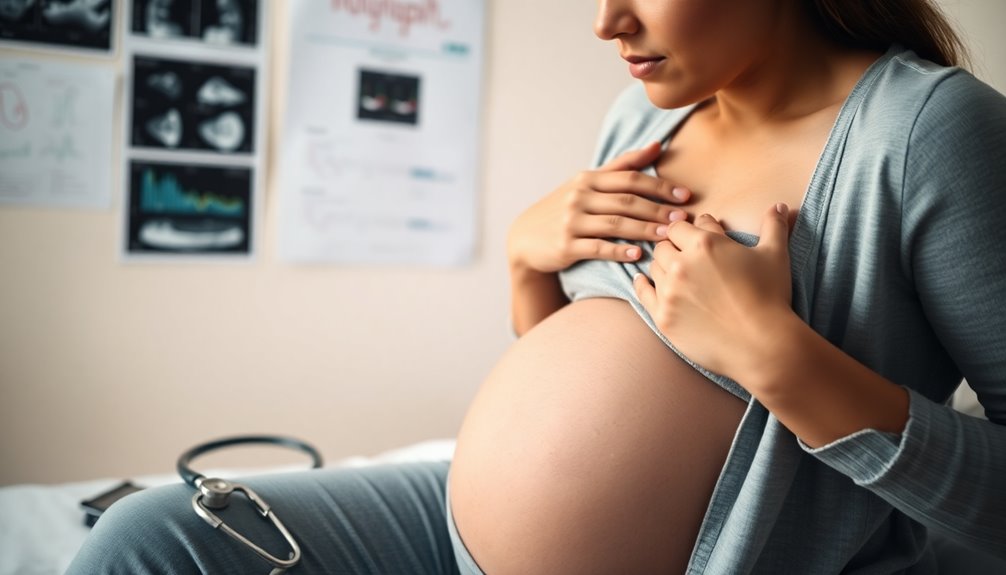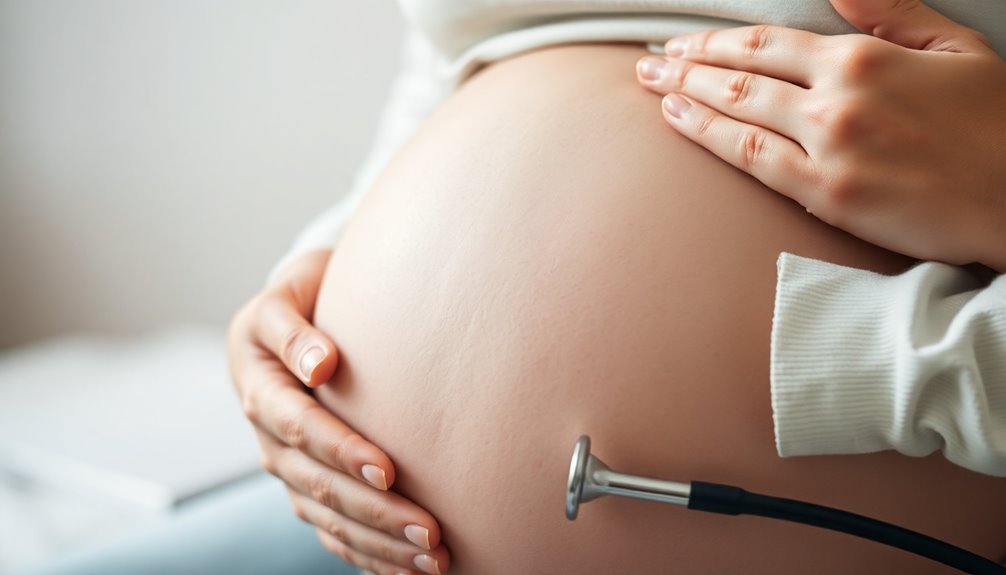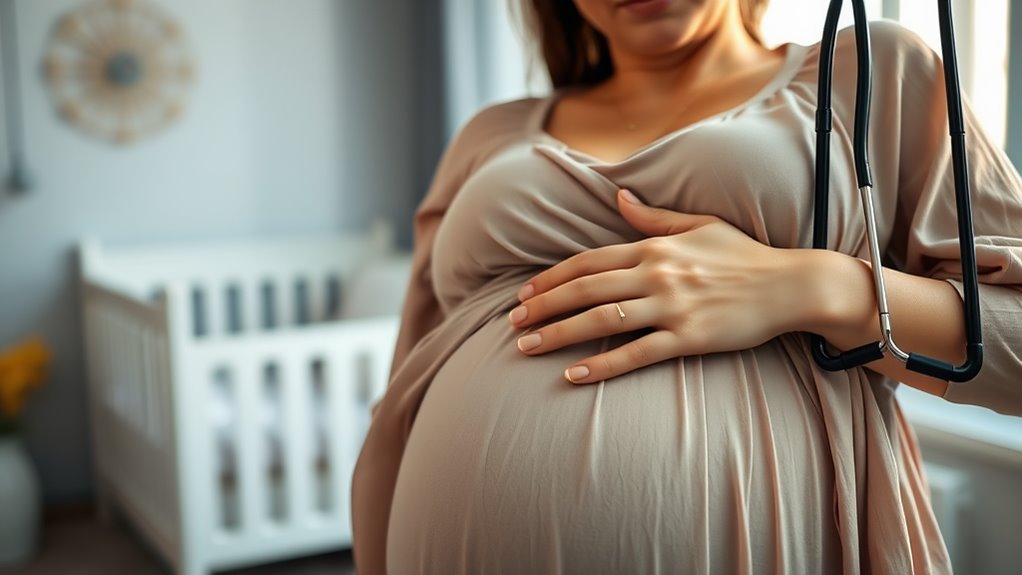Heart palpitations and chest tightness during pregnancy can be surprising, but they're often normal due to your body adapting to increased blood volume and hormonal changes. About 20-30% of pregnant women experience these sensations, usually peaking in the third trimester. While most cases are harmless, symptoms like chest pain or shortness of breath shouldn't be ignored. It's crucial to communicate with your healthcare provider for peace of mind and to understand more about managing these experiences.
Key Takeaways
- Heart palpitations are common in pregnancy, affecting 20-30% of women due to increased blood volume and hormonal changes.
- Chest tightness alongside palpitations may indicate a serious condition and requires immediate medical evaluation.
- Symptoms like lightheadedness or shortness of breath with palpitations warrant urgent consultation with a healthcare provider.
- Lifestyle factors such as anxiety, caffeine, and dehydration can exacerbate palpitations and chest tightness during pregnancy.
- Regular prenatal visits are essential for monitoring symptoms and ensuring maternal and fetal well-being.
What Are Heart Palpitations in Pregnancy?

Heart palpitations during pregnancy can feel alarming, but they're often a normal response to the body's increased demands. As your body accommodates the needs of your growing baby, your heart works harder, pumping 30-50% more blood.
Heart palpitations during pregnancy are often a normal response as your body pumps 30-50% more blood to support your growing baby.
You might notice symptoms like a pounding, racing, or fluttering heartbeat, especially in the third trimester when about 20% of your blood goes to the uterus.
Factors like anxiety, caffeine, dehydration, and hormonal changes can trigger these palpitations. While they're usually benign, it's important to monitor them, especially if you experience additional symptoms like chest pain or shortness of breath. Seeking professional help can provide reassurance and guidance in managing any concerns during this time.
Regular check-ups with your healthcare provider can help guarantee your and your baby's health during this critical time.
How Common Are Heart Palpitations During Pregnancy?

Around 20% to 30% of pregnant women experience heart palpitations, making them a relatively common occurrence during this time. These palpitations often result from physiological changes in your body, including increased blood volume and hormonal fluctuations. Additionally, anxiety and stress can exacerbate these sensations.
| Cause | Effect | Notes |
|---|---|---|
| Increased Blood Volume | Sensation of Palpitations | Rises by 30% to 50% |
| Hormonal Changes | Fluctuations in Heart Rate | Notable in first/third trimesters |
| Stress and Anxiety | Triggering Palpitations | Common among expecting mothers |
While most heart palpitations are benign and resolve postpartum, it is important to monitor them and discuss any concerns with a healthcare provider. Emotional dysregulation can also manifest during pregnancy, potentially contributing to intense emotional responses.
What Are the Symptoms of Heart Palpitations During Pregnancy?

What does it feel like when you experience heart palpitations during pregnancy? You might notice a fluttering sensation or a racing heartbeat, often felt in your chest, throat, or neck.
These heart palpitations can also come with symptoms during pregnancy like chest tightness, shortness of breath, lightheadedness, or anxiety, especially during stressful moments or fatigue.
An increased heart rate, typically rising by 10 to 20 beats per minute, can make these sensations more frequent.
Triggers such as hormonal changes, anxiety, caffeine intake, and dehydration can intensify these experiences. Regular check-ups can help ensure that any underlying issues are addressed and monitored during this critical time.
While heart palpitations are usually harmless, if you encounter persistent or severe symptoms, it's essential to report them to your healthcare provider for further evaluation and peace of mind.
What Causes Pregnancy Heart Palpitations?

Experiencing heart palpitations during pregnancy can raise questions about their underlying causes. One major reason is the increased blood volume, which can rise by 30% to 50%, putting extra strain on your heart.
Hormonal changes, particularly higher levels of progesterone and estrogen, can also heighten heart sensitivity and contribute to these palpitations.
Additionally, anxiety and stress are common during pregnancy, often triggering adrenaline release, which can further exacerbate your symptoms.
Certain factors like caffeine consumption or medications, especially decongestants containing pseudoephedrine, can worsen the situation.
Finally, conditions like anemia, which is frequent in pregnancy, can limit oxygen delivery to your heart, potentially leading to heart palpitations.
Understanding these causes can help you manage your symptoms better. Furthermore, recognizing the impact of emotional instability during pregnancy can also play a role in how your body responds to stressors.
How Do Healthcare Providers Diagnose Heart Palpitations During Pregnancy?

How do healthcare providers accurately diagnose heart palpitations during pregnancy?
They start by gathering a detailed medical history, asking about any past palpitations and your family's heart health.
After that, they conduct a thorough physical examination, focusing on your heart and lung function, and listening for any abnormal sounds or rhythms.
Electrocardiograms (EKGs) may also be performed to assess your heart's electrical activity, though they mightn't always catch intermittent palpitations.
For extended monitoring, providers often use a Holter monitor, which tracks your heart rhythm for 24 to 48 hours, helping correlate your symptoms with any irregularities.
Additionally, blood tests are done to check for conditions like electrolyte imbalances or anemia, which could contribute to your palpitations. In some cases, healthcare providers may also recommend mammography screening to rule out any underlying health issues that could be affecting your heart health.
How Do Providers Treat Heart Palpitations During Pregnancy?

After diagnosing heart palpitations during pregnancy, healthcare providers focus on treatment options tailored to your specific situation.
Most cases don't require treatment unless they're frequent, severe, or linked to underlying heart conditions. Lifestyle modifications, like staying hydrated, cutting back on caffeine and sugar, and practicing relaxation techniques, can often help manage palpitations. Engaging in self-care routines can also support your emotional well-being during this time.
If your palpitations relate to anxiety or depression, addressing those mental health issues through therapy or medications might be part of your treatment plan.
In some cases, providers may prescribe beta blockers, especially if an underlying arrhythmia is present, weighing the benefits and risks for both you and your baby.
Regular monitoring and clear communication with your healthcare team are essential throughout your pregnancy.
Can I Prevent Heart Palpitations During Pregnancy?

While you may not be able to eliminate heart palpitations entirely during pregnancy, there are several effective strategies you can use to reduce their frequency and intensity.
Start by staying well-hydrated and maintaining a balanced diet rich in nutrients. Limiting caffeine and sugar intake is essential, as these stimulants can trigger palpitations and increase your heart rate.
Staying hydrated and eating a nutrient-rich diet while limiting caffeine and sugar can help reduce heart palpitations during pregnancy.
Practicing relaxation techniques like meditation or yoga can help alleviate stress and anxiety, common triggers for heart palpitations.
Regular prenatal check-ups allow your healthcare provider to monitor your heart health and offer personalized recommendations to prevent heart issues.
Finally, engaging in light, physician-approved exercise can boost your overall cardiovascular health and may reduce the occurrence of palpitations during this special time. Including a low-carb meal option in your diet, like the Turkey Bean and Tomato Zoodle Bowl, can also help support your heart health during pregnancy.
What Is the Outlook for People With Heart Palpitations During Pregnancy?

Although experiencing heart palpitations during pregnancy can be concerning, the outlook for most women is quite positive. Here are some key points to reflect on:
- Heart palpitations affect about 20-30% of pregnant women.
- Most cases resolve after delivery as your body returns to its prepregnancy state.
- Serious underlying conditions are rare but should be ruled out if symptoms persist.
For most pregnant women, these palpitations are generally not dangerous and often don't require treatment unless you notice other concerning symptoms like chest pain or difficulty breathing.
Regular monitoring and communication with your healthcare provider are essential in managing any underlying condition that may contribute to your palpitations, ensuring both your health and your baby's well-being. Additionally, many women find that stress management techniques, similar to those recommended during successful co-parenting, can help alleviate anxiety that may worsen palpitations.
When Should I See My Healthcare Provider About Heart Palpitations During Pregnancy?

When should you consult your healthcare provider about heart palpitations during pregnancy?
If you experience heart palpitations that are frequent, last longer than usual, or feel more intense, it's time to see your doctor.
Immediate medical attention is vital if your palpitations come with chest pain, difficulty breathing, dizziness, or confusion, as these could signal a serious condition.
Regular prenatal visits are important for discussing any concerning symptoms, including heart palpitations.
Be sure to inform your doctor about any family history of heart conditions or previous palpitations, as that may require further evaluation.
Monitoring your symptoms and reporting significant changes can help guarantee both your health and your baby's during this important time. Additionally, emotional distress from other factors, such as relationship issues, can exacerbate physical symptoms like palpitations.
Frequently Asked Questions
Can Very Early Pregnancy Cause Heart Palpitations?
Yes, very early pregnancy can cause heart palpitations. As your body undergoes significant changes, increased blood volume and hormonal fluctuations, particularly progesterone, can heighten your heart's workload.
You might notice a racing or pounding heartbeat as your body adjusts to these changes. Additionally, anxiety and stress are common during early pregnancy, which can also trigger palpitations.
While these sensations are often benign, it's important to discuss any concerns with your healthcare provider.
What Are 5 Warning Signs of a Possible Problem During Pregnancy?
During pregnancy, it's essential to recognize warning signs that could indicate a problem.
If you experience chest pain or discomfort, shortness of breath, lightheadedness, severe swelling in your limbs, or a rapid heart rate, don't ignore them.
These symptoms may signal serious issues that require immediate medical attention.
Always prioritize your health and consult with a healthcare provider to guarantee both you and your baby are safe.
When Should I Go to the ER for Heart Palpitations During Pregnancy?
If you're feeling heart palpitations, particularly with persistent pain or pressure, don't hesitate to head to the ER.
Symptoms like shortness of breath, dizziness, or confusion signal serious risks.
If you notice palpitations lasting longer than usual or feeling more intense, it's vital to seek immediate medical help.
Trust your instincts; it's better to be safe than sorry when it comes to your health and your baby's well-being.
Can You Get Heart Palpitations From Early Pregnancy Miscarriage?
You might experience heart palpitations during early pregnancy, especially if you're feeling anxious about a miscarriage.
While palpitations can occur due to hormonal changes and increased blood volume, the emotional stress from a potential miscarriage can trigger them too.
It's crucial to listen to your body.
If you're worried about your symptoms, don't hesitate to reach out to your healthcare provider for guidance and support.
Your health and peace of mind are important.
Conclusion
In summary, experiencing heart palpitations and chest tightness during pregnancy can feel like your heart's racing in a marathon, and it's crucial to pay attention. While these symptoms are often benign, they shouldn't be ignored. Keep an open line of communication with your healthcare provider to guarantee both you and your baby stay healthy. Remember, you're not alone in this journey, and addressing any concerns early can lead to peace of mind and a smoother pregnancy experience.









